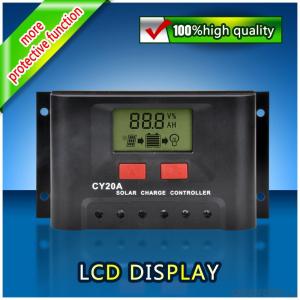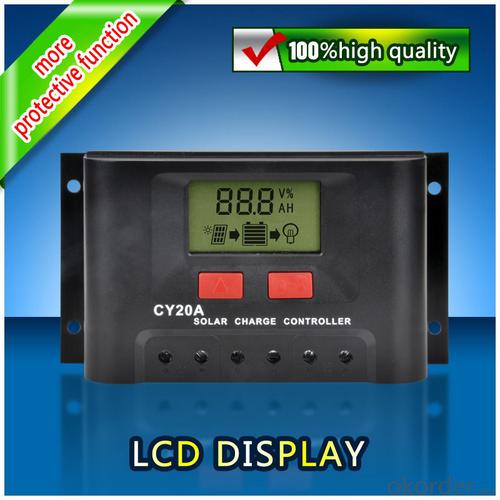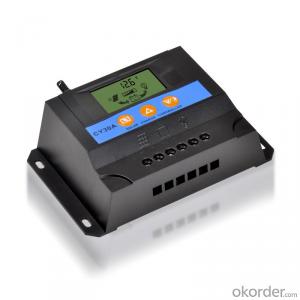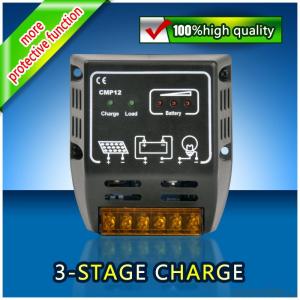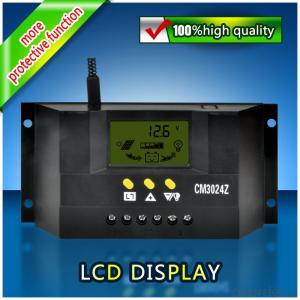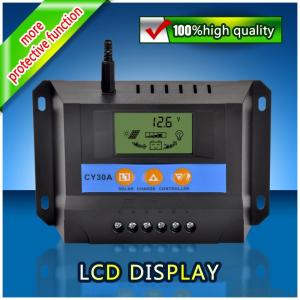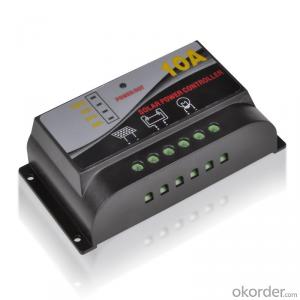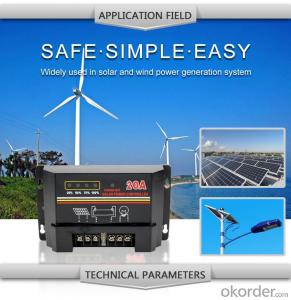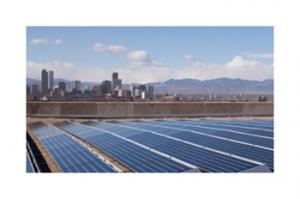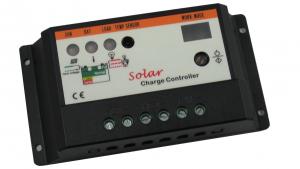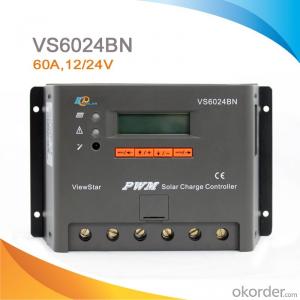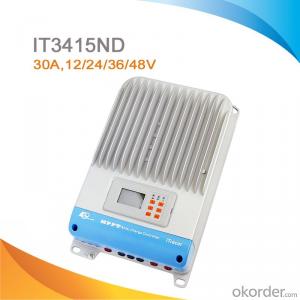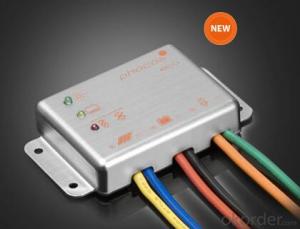Pentair Solar Poll Controllers - Solar LCD Controller CY20A with the Best Price
- Loading Port:
- China main port
- Payment Terms:
- TT or LC
- Min Order Qty:
- 1 unit
- Supply Capability:
- 10000 unit/month
OKorder Service Pledge
OKorder Financial Service
You Might Also Like
Product Introduction
Solar controller is control device which can control solar panel and transform solar energy into electricity then store to the battery bank. Solar controller is the most important part in offgrid system, whose performance has much effect on life expectancy and operation of the whole system, especially the battery expectancy.
Application Areas
Standalone Photovoltaic power station
Standalone Domestic household photovoltaic power system
Mobil communication base stations, expressway and other non-residential regions.
Coastal islands, remote mountainous, border posts for regions shortage of or without electricity.
Government demonstration projects, landscape lighting project etc.
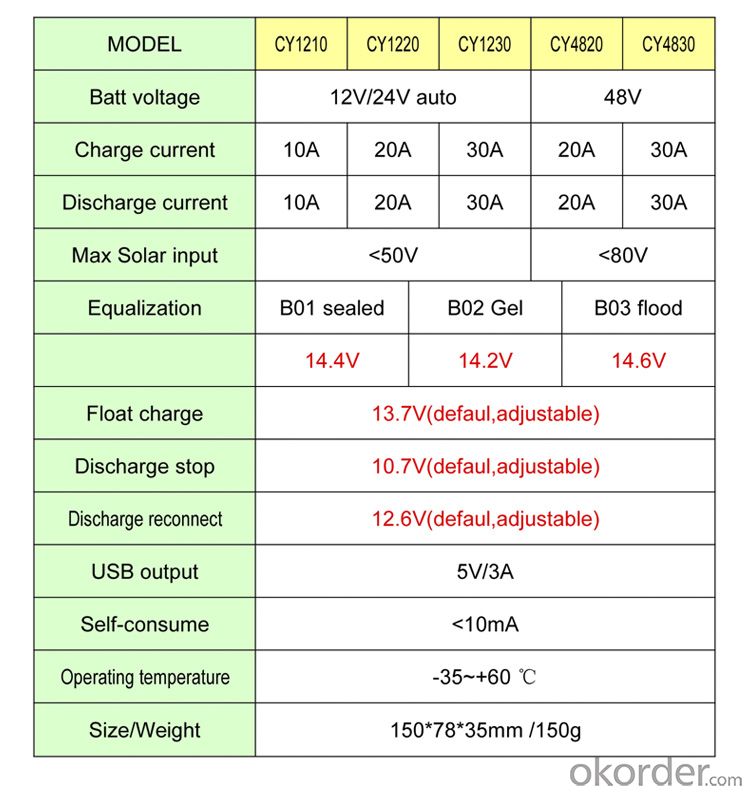
Selection of high-quality materials properties be consistent from beginning to end
For life is a convenient
A little more secure
The innovation design idea of the perfect show
The first set of people-oriented
The high-end configuration components
- Q: Can a solar controller be used with a solar-powered beekeeping system?
- Yes, a solar controller can be used with a solar-powered beekeeping system. A solar controller is designed to regulate and optimize the charging and discharging of batteries in a solar system. In a solar-powered beekeeping system, the solar controller would ensure that the batteries storing the solar energy are charged efficiently and that the power is distributed appropriately to power the various components of the beekeeping system, such as pumps, heaters, or lights.
- Q: What is the purpose of the battery low voltage disconnect feature on a solar controller?
- The purpose of the battery low voltage disconnect feature on a solar controller is to protect the battery from being over-discharged. It automatically cuts off the power supply to prevent the battery voltage from dropping to a critically low level, which could damage the battery and reduce its lifespan. This feature ensures that the battery remains in a safe operating range and helps to prolong its overall efficiency and performance.
- Q: What is the purpose of a solar controller in a solar power system?
- The purpose of a solar controller in a solar power system is to regulate and control the flow of electricity between the solar panels and the batteries. It ensures that the batteries are charged efficiently and prevents overcharging, which can damage the batteries. Additionally, the solar controller also protects the batteries from discharging too much during periods of low sunlight, extending their lifespan.
- Q: How do I prevent reverse current flow with a solar controller?
- To prevent reverse current flow with a solar controller, you can use a diode or a blocking diode in the circuit. This diode will allow current flow from the solar panel to the battery but block any reverse current flow from the battery back to the solar panel, effectively preventing any damage to the system.
- Q: Can a solar controller be used with solar panels of different sizes?
- Yes, a solar controller can be used with solar panels of different sizes. The role of the solar controller is to regulate the charging and discharging of the batteries, and it is compatible with a range of solar panel sizes and configurations. However, it is important to ensure that the solar controller is appropriately sized and can handle the maximum voltage and current of the connected solar panels.
- Q: Can a solar controller be used with an inverter?
- Yes, a solar controller can be used with an inverter. In fact, it is recommended to use a solar controller with an inverter in order to regulate the charging and discharging of batteries connected to the solar panel system. The solar controller helps to maximize the efficiency of the solar panel system by preventing overcharging or over-discharging of the batteries, while the inverter converts the direct current (DC) power generated by the solar panels into alternating current (AC) power that can be used to power appliances and devices.
- Q: Can a solar controller be used with solar panels that are located far away from the batteries?
- Yes, a solar controller can be used with solar panels that are located far away from the batteries. The purpose of a solar controller is to regulate the charging of batteries from solar panels, ensuring that the batteries are not overcharged or damaged. In a system where the solar panels are located far away from the batteries, the controller can be placed near the batteries to regulate the charging process effectively. The controller can be connected to the solar panels through appropriately sized wires to minimize voltage drop and energy loss over the distance. It is important to choose the right wire gauge to minimize resistance and ensure efficient energy transfer. Additionally, it is advisable to consider the voltage drop over distance and use appropriate wire size calculations or consult with a professional to ensure the setup is optimized for maximum efficiency.
- Q: Can a solar controller be used with a solar-powered satellite dish?
- Yes, a solar controller can be used with a solar-powered satellite dish. A solar controller is essential for regulating the power output from the solar panels and ensuring that the satellite dish receives a consistent and stable power supply. It helps protect the batteries from overcharging and optimizes the energy conversion process. Thus, a solar controller is a crucial component in the functioning of a solar-powered satellite dish.
- Q: How does a solar controller handle the protection against overloads?
- A solar controller handles protection against overloads by continuously monitoring the current flow between the solar panels and the battery bank. It uses built-in circuitry to detect when the current exceeds a safe limit. Once an overload is detected, the controller will automatically reduce the charging current or temporarily interrupt the charging process to prevent damage to the system. This protection mechanism ensures the longevity and safety of the solar panels and battery bank.
- Q: Can a solar controller be used with solar panels of different ages?
- Yes, a solar controller can be used with solar panels of different ages. The purpose of a solar controller is to regulate the flow of energy from the solar panels to the battery or the grid. It does not depend on the age of the panels, rather it focuses on managing the energy generated by them. However, it is important to ensure that the voltage and current ratings of the solar controller are compatible with the solar panels being used to ensure optimal performance and prevent any damage to the system.
Send your message to us
Pentair Solar Poll Controllers - Solar LCD Controller CY20A with the Best Price
- Loading Port:
- China main port
- Payment Terms:
- TT or LC
- Min Order Qty:
- 1 unit
- Supply Capability:
- 10000 unit/month
OKorder Service Pledge
OKorder Financial Service
Similar products
Hot products
Hot Searches
Related keywords
